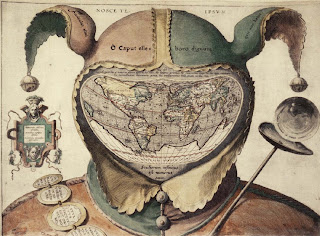26For consider your calling, brothers: not many of you were wise according to worldly standards, not many were powerful, not many were of noble birth. 27But God chose what is foolish in the world to shame the wise; God chose what is weak in the world to shame the strong; 28God chose what is low and despised in the world, even things that are not, to bring to nothing things that are, 29so that no human being might boast in the presence of God. 30And because of him you are in Christ Jesus, who became to us wisdom from God, righteousness and sanctification and redemption, 31so that, as it is written: "Let the one who boasts, boast in the Lord."~ 1 Corinthians 1:26-31
A few months ago, when I heard this passage referred to in a sermon, it occurred to me to ask a question:
Why does God tend to choose 'the ignoble, the foolish, the weak, the low, the despised, and the nobodies'?
It seems that there should be some purpose or advantage to this pattern, especially given the intended end result spoken of in verse 30. Let's consider things abstractly, since I think experience is likely to mislead us from drawing general conclusions. Consider that, in accordance with natural theology and Scripture, there are certain truths about God and reality that are attainable to a person solely in virtue of natural reason apart from divine (or special) revelation (e.g. the existence of God, certain divine attributes, the sinful condition). Given the identifiable limitations, we know that natural reason cannot attain to knowledge of a redemptive hope, which is requisite for salvation. But more than that, as Aquinas points out, divine revelation is needed not only to render the knowledge of salvation epistemically accessible; it is also needed to be given in such a way as to bypass the time (and other) constraints of ordinary life. For even the truths about God that are naturally attainable are only so hypothetically--if a person could find enough time for leisure in which he could devote himself to exploring philosophical issues. And even the small number who would have a lot of time for leisure would also need to be disciplined and intentional about the search. Yet even those few would still be prone to error. Hence, as Aquinas explains, divine revelation doesn't only reveal naturally inaccessible truths, but many accessible truths that would otherwise be difficult to discover naturally.
With this in mind, I thought to ask:
Why would God choose to reveal these truths primarily to the common person?
From a "worldly" perspective (cf. v.26), it would seem to make more sense that God should choose to reveal truths about God, salvation, and the world to the intellectual elites of humanity. They're already interested and searching for answers, so wouldn't they be the most apt to understand and reflect upon revelation? And wouldn't giving it to them help the common person more, since they could interpret it and disseminate it to the ordinary person better than anyone else?
The problem with this perspective is the assumption that there is a disconnect between truth and morality--it is this point that I think is crucial to understanding why God would tend to choose to reveal himself to 'the ignoble, foolish, weak, low, despised, and the nobody.' In biblical wisdom literature, the wise person is also the righteous person and so the fool is also wicked. It's clear also that Paul assumes this connection later in 1 Corinthians when he writes: "[Love] does not rejoice in injustice, but rejoices with the truth" (13:6). It seems to me that if God were to have given revelation primarily to the intellectual elite, they would tend toward arrogance. This point fits well with Paul's message in the passage under discussion. And since God intends for human beings to be both morally and intellectually virtuous, it would be prudent for God not to add knowledge to the knowledgeable but to give revelation to those of low estate. Their lowliness would generally make them more apt to receive such revelation with humility and not with arrogance, as if it were the result of personal achievement or merit. (Of course these are generalizations and are not to be taken to apply to every individual respective to their category.) Therefore, it would appear that God chooses the lowly in order to conform them to his image both morally and intellectually.
Some Implications to Consider
Knowledge is not the same as intellectual virtue. Take any of the plethora of examples of a non-intellectual or poorly educated Christian who encounters an intellectual non-believer in discussion or debate--say a Christian ungraduate student faces off with his atheist philosophy professor. Generally speaking, in such cases I think the primary problem is not that the Christian student believes false things (though this can be a problem) and that the non-Christian professor believes true things, but that the Christian cannot think critically and the professor can. In other words, the Christian tends to lack intellectual virtue whereas the non-Christian intellectual tends to possess intellectual virtue (at least comparatively speaking).
What will remedy this problem?
While the Church must always emphasize teaching Christians the Bible and theological truths, this by itself will not solve the problem. The Church also needs to help Christians to develop intellectual virtue. In fact, I would argue that the Church ought to make this one of the primary emphases in discipling Christians.



No comments:
Post a Comment